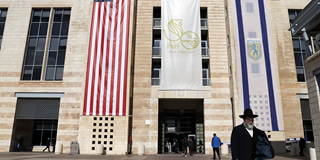The US administration seems to believe that Saudi Arabia and other Arab governments are so concerned with the perceived Iranian threat that they will put aside their long-standing hostility toward Israel. The problem is that the new Saudi crown prince's highest priority – to consolidate his power – may lead him to reject a peacemaking role.
NEW YORK – It is 50 years since the Six-Day War – the June 1967 conflict that, as much as any other event, continues to define the Israeli-Palestinian impasse. After the fighting was over, Israel controlled all of the West Bank, Gaza, and Jerusalem, in addition to the Sinai Peninsula and the Golan Heights.
Back then, the world saw this military outcome as temporary. United Nations Security Council Resolution 242, the backdrop to what was to become a diplomatic solution to the problem of the stateless Palestinians, was adopted some five months after the war ended. But, as is often the case, what began as temporary has lasted.
This is the context in which President Donald Trump recently declared that the United States recognized Jerusalem to be Israel’s capital. Trump stated that the US was not taking a position on the final status of Jerusalem, including “the specific boundaries of the Israeli sovereignty” there. He made clear that the US would support a two-state solution if agreed to by both sides. And he chose not to begin actually moving the US embassy from Tel Aviv, even though he could have simply relabeled what is now the US consulate in Jerusalem.

NEW YORK – It is 50 years since the Six-Day War – the June 1967 conflict that, as much as any other event, continues to define the Israeli-Palestinian impasse. After the fighting was over, Israel controlled all of the West Bank, Gaza, and Jerusalem, in addition to the Sinai Peninsula and the Golan Heights.
Back then, the world saw this military outcome as temporary. United Nations Security Council Resolution 242, the backdrop to what was to become a diplomatic solution to the problem of the stateless Palestinians, was adopted some five months after the war ended. But, as is often the case, what began as temporary has lasted.
This is the context in which President Donald Trump recently declared that the United States recognized Jerusalem to be Israel’s capital. Trump stated that the US was not taking a position on the final status of Jerusalem, including “the specific boundaries of the Israeli sovereignty” there. He made clear that the US would support a two-state solution if agreed to by both sides. And he chose not to begin actually moving the US embassy from Tel Aviv, even though he could have simply relabeled what is now the US consulate in Jerusalem.